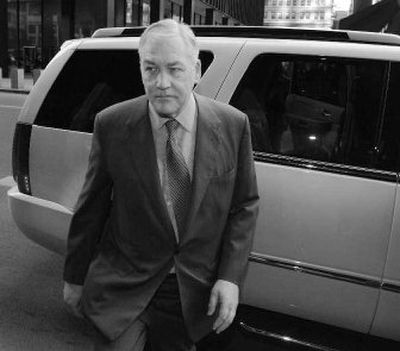‘This was not Enron’

CHICAGO — Former media baron Conrad Black’s racketeering trial got under way Tuesday with a federal prosecutor calling him a corporate swindler who stole millions of dollars and his attorney ripping into the government’s star witness as a liar.
“It was theft, it was fraud, it was crime,” federal prosecutor Jeffrey H. Cramer said in a fiery opening statement.
But defense attorney Edward M. Genson said the money was made legally and scoffed at the notion that Black and his three co-defendants had defrauded shareholders in the Hollinger International newspaper empire.
“They were entitled to the money,” Genson said. “Were they entitled to that much money? That’s a philosophical matter.”
Genson appealed to jurors not to blame Black for getting millions of dollars in payments from buyers when he sold off hundreds of community newspapers across the United States and Canada.
“This was not Enron,” Genson said.
Black, 62, is charged along with Jack Boultbee, 63, of Vancouver, Hollinger’s former chief financial officer; Peter Y. Atkinson, 59, of Toronto, the company’s former general counsel; and Mark Kipnis, 60, an attorney who served as corporate secretary in the Chicago headquarters.
The men are accused of siphoning $60 million out of Hollinger through asset sales in which all but Kipnis pocketed millions of dollars in payments from buyers.
Black by himself is alleged to be responsible for $84 million that the company lost through the payments, which Cramer told jurors eventually turned into “a bold money grab” by the executives.
Genson painted the government’s star witness, F. David Radler, the No. 2 man in Black’s organization for decades, as a liar who would say anything to please the federal prosecutors who have him a deal.
“David Radler will come into this court and lie to you about Conrad Black,” Genson said. He said that Radler would claim every deal Hollinger made “magically became a Black-orchestrated deal after Radler cut his deal.”
Radler pleaded guilty to one count of mail fraud and agreed to testify for the government in return for a relatively lenient 29-month sentence and $250,000 fine. Prosecutors say that Black, if convicted, could be sentenced to 101 years in federal prison.
U.S. District Judge Amy J. St. Eve, who is presiding over the trial, would decide on the sentence, and Black would probably receive much less time if convicted.
Black, Boultbee and Atkinson received payments in return for agreeing not to compete with companies that bought hundreds of U.S. and Canadian community newspapers from Hollinger.
Cramer told jurors the money should have gone to Hollinger shareholders and that, when questions were asked about the payments, Black brushed them aside as “an epidemic of shareholder idiocy.”